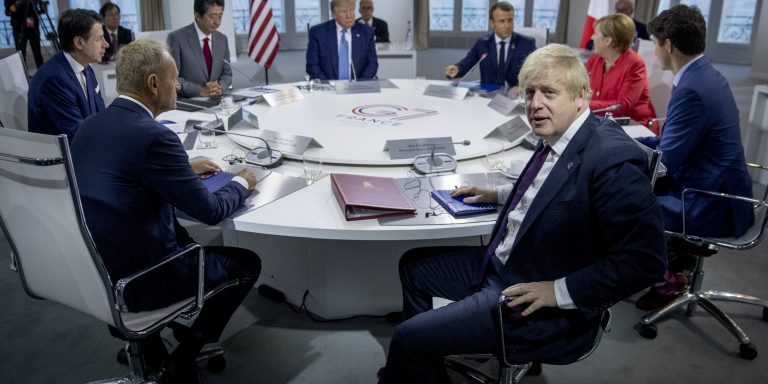INTELBRIEF
August 27, 2020
IntelBrief: From G7 to D10? Australia, India, and South Korea Look to Join the Club

Bottom Line Up Front
- This past May, UK Prime Minister Boris Johnson floated the idea of expanding the G7 to include Australia, India, and South Korea, transforming the Group of 7 to the Democracy 10, or D10.
- The G7 is an organization in dire need of reformation and in its current iteration, will struggle to maintain relevance in global politics and international relations.
- Any strategic organization between democracies in the Pacific, especially one specifically designed to counter Huawei’s 5G efforts, will draw ire from Chinese policymakers.
- The D10 could assert itself as a ‘democratic’ counterbalance to Chinese aggression, acting as an economic complement to the military quad-alignment of Japan, Australia, India, and the U.S. in the Pacific.
This past May, UK Prime Minister Boris Johnson floated the idea of expanding the G7 (the group of seven) to include Australia, India, and South Korea. The new, expanded organization, dubbed D10 (short for Democracy 10), will coordinate member states’ efforts to counter Chinese progress in the field of 5G technology and to secure tech supply chains. Under Johnson, whose government announced a ban on the use of Chinese 5G materials in its networks earlier this summer, Britain is well-positioned to realize this ambition. The UK holds the presidency for the G7 in 2021. Given the rapid escalation in tensions between the United States and China, the international order would benefit from a more formal and organized approach to establishing a balance in the field of telecommunications. Yet, obstacles abound. Many of the proposed member states have pursued conflicting approaches to their telecoms policy. For example, neither South Korea nor Australia has mirrored the United States in banning Huawei products, a necessary step if the group is to function as a secure technological innovation hub. There are also several democratic nations with impressive telecoms capabilities not represented on the shortlist, including Finland, Norway, and Israel. If British representatives are serious about the D10, they must commit to thoroughly investigating the economic and political repercussions of such an arrangement and dedicate themselves to the establishment of a lasting, secure, and mutually beneficial cooperative based on shared values.
The G7 is an organization in dire need of reformation. Once comprising nearly 70% of global nominal GDP, G7 member states now hold a paltry 50%. This drop is due, primarily, to the drastic eastwards shift in the global economy. The G20, another global economic cooperation organization of which South Korea, Australia, India, and, most notably, China are all members, now boasts nearly 80% of global GDP and over 66% of the world’s population. In its current iteration, the G7 will struggle to maintain relevance. Neither of the two most significant competitors to Huawei, Nokia (Finland) and Ericsson (Australia), is hosted by a G7 member country. On the heels of Johnson and Trump’s respective bans on Huawei technologies, both the US and UK are in desperate need of partners. There will be a significant first-mover advantage to those who fully realize 5G technologies first, and it is unlikely that either Washington or London could do this independently. In this sense, D10 represents an enormous opportunity for North American and European members, if the organization is set up for success, and not simply as a vanity project.
Any strategic organization between democracies in the Pacific, especially one specifically designed to counter Huawei’s 5G efforts, will draw ire from Chinese policymakers. With tensions between Beijing and the West at a historic high, such cooperation risks driving relations past the point of no return. Regression to Cold War-era type proxy wars and zero-sum competition would pose a threat to the global economy and regional stability. At the same time, many democratic observers are growing wary of increasingly aggressive Chinese policy in both the Indo-Pacific theatre and beyond. Policymakers who worry about Beijing’s ‘wolf-warrior’ tactics and authoritarian control of an increasingly dominant tech sector must skillfully strike the right balance between diplomacy and pressure. Democracies cannot face China’s threat alone, as much as isolationists would like to believe, and international cooperation will be vital in taming any expansionism from Beijing.
With the implementation of the National Security Law in Hong Kong firmly bringing the city under control, the Chinese Communist Party (CCP) could now set its sights on uniting China by annexing Taiwan. The D10 could assert itself as a ‘democratic’ counterbalance to Chinese aggression, acting as an economic complement to the military quad-alignment of Japan, Australia, India, and the United States in the Pacific. Luckily for proponents of D10, the organization will not be a military alliance. Its narrow focus and small size will make it an easier sell than NATO, or even the G20. The short-term security for tech supply chains and long-term de-escalatory power offered by the group make it an attractive proposition for both hawks and doves. However, the organization’s creation is dependent on the whims of populist, erratic leaders in key proposed member states such as the United States, India, Japan, and Australia. Regardless of the victor in the 2020 U.S. presidential election, the U.S.-China relationship is likely to remain antagonistic, and could deteriorate further. Likewise, Morrison, Abe, and Modi, all within a more immediate geographic proximity to China, will remain wary of any propositions that are perceived to weaken their domestic position vis-a-vis their increasingly aggressive neighbor. Boris Johnson may be the perfect man for the job of forging a consensus. The future of his idea will rest on his ability to convince these big four, along with the rest of the G7, that D10 is what the democracies of the future need.